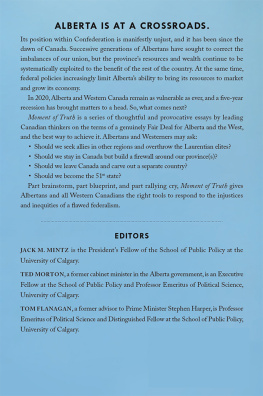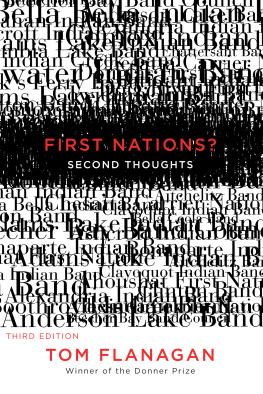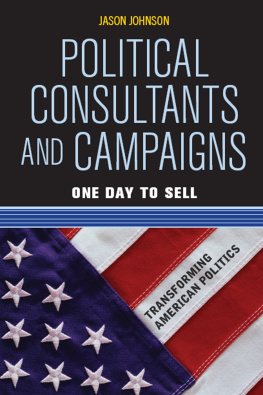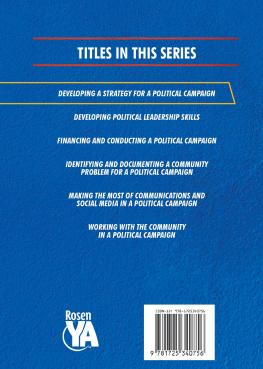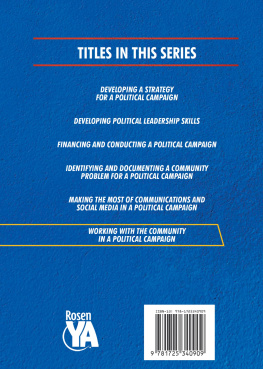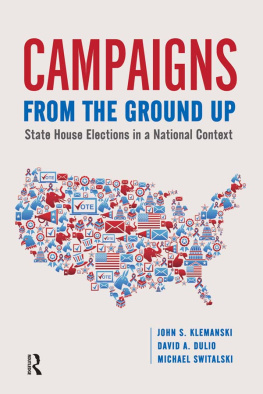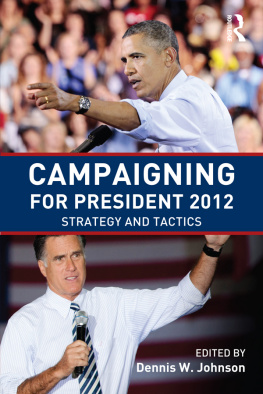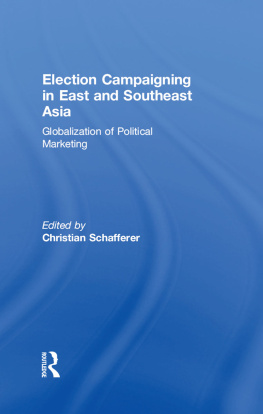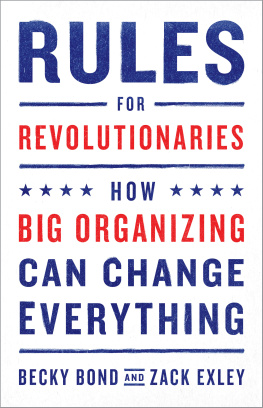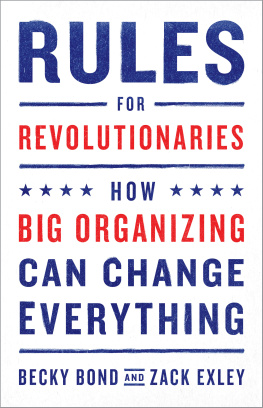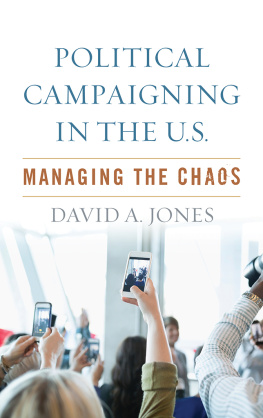WINNING POWER
Winning Power
Canadian Campaigning in the
Twenty-First Century
TOM FLANAGAN

McGill-Queens University Press 2014
ISBN 978-0-7735-4331-7 (cloth)
ISBN 978-0-7735-9036-6 (ePDF)
ISBN 978-0-7735-9037-3 (ePUB)
Legal deposit first quarter 2014
Bibliothque nationale du Qubec
Printed in Canada on acid-free paper that is 100% ancient forest free (100% post-consumer recycled), processed chlorine free
McGill-Queens University Press acknowledges the support of the Canada Council for the Arts for our publishing program. We also acknowledge the financial support of the Government of Canada through the Canada Book Fund for our publishing activities.
Library and Archives Canada Cataloguing in Publication
Flanagan, Thomas, 1944, author
Winning power : Canadian campaigning in the twenty-first century / Tom Flanagan.
Includes bibliographical references and index.
Issued in print and electronic formats.
ISBN 978-0-7735-4331-7 (bound). ISBN 978-0-7735-9036-6 (ePDF). ISBN 978-0-7735-9037-3 (ePUB)
1. Political campaigns Canada. 2. Campaign funds Canada.
3. Political campaigns Technological innovations Canada.
4. Political campaigns Alberta Case studies. I. Title.
JL193.F53 2014 | 324.70971 | C2013-907147-4 |
C2013-907148-2 |
Typeset by Jay Tee Graphics Ltd. in 10.5/14 Sabon
Contents
Figures and Tables
FIGURES
TABLES
WINNING POWER
Introduction
Political campaigns are major events: almost fifteen million people voted in the 2011 Canadian general election. Candidates with any reasonable chance of winning typically report that they are helped by hundreds of volunteers. Even fringe candidates and also-rans may have a few dozen volunteers. No one has ever done a national tally, but with 308 federal constituencies, the total number of volunteers might be over 200,000, maybe even approaching 300,000. And a similar number of people are recruited by Elections Canada for relatively little pay in order to man the voting booths on election day. Thats a lot of people to be actively involved in a single project, especially one that goes on for thirty-six days, sometimes even longer.
Considering the number of people involved and the duration of the event, national political campaigns are probably the largest participatory exercises in Canadian life outside of wartime. Provincial and local campaigns are just as intense relative to the size of the jurisdiction in which they take place. And even for many of those not actively participating, a campaign is a crucial event because it dominates all news media, not only during the campaign but for weeks before and after.
So campaigns are a big deal. Beyond that, they are intrinsically important because they determine who will control the machinery of government for the next few years. Except in the special case of referendums, campaigns do not decide questions of public policy, but they lead up to the choice of the representatives who will make those decisions. Campaigns, therefore, are absolutely central to the practice of modern democracy.
Political campaigning is important in every democracy, but it has been on particular display in Canada in the new millennium. We have seen national elections in 2000, 2004, 2006, 2008, and 2011, as well as leadership races for the Canadian Alliance, Progressive Conservatives, Conservative Party of Canada, Bloc Qubcois, Liberals (3), New Democrats (2), and Greens (2). There have been so many campaigns that Canadians may have become tired of them, and perhaps a bit cynical. This book goes back to basics to explain to jaded observers what campaigns are and why they are so important.
Also, it is not just a question of the number of campaigns. The whole environment for national campaigning in Canada has changed significantly in the past decade in at least four areas:
the identity of the major players, including not just new political parties but organized labour, which now plays a major role in several provinces
the legislated rules, especially the financial rules of the game
the ever-growing importance of new communications media
the rise of the permanent campaign, with new tactics such as large-scale negative advertising in the pre-writ period
The change in the players is little short of remarkable. In 2000, the Liberal Party of Canada beat back a challenge from the newly formed Canadian Alliance, and the conventional wisdom was that the Liberals would be in power for the foreseeable future. All observers agreed that the Liberals were the pace-setters in Canadian campaigning in fundraising, technology, and message discipline. The enduring primacy of Liberal campaigning was reflected in the title of Stephen Clarksons book The Big Red Machine, which chronicled Liberal campaigns from 1974 through 2004. But Stephen Harper replaced Stockwell Day as leader of the Canadian Alliance, talked the Progressive Conservatives into a merger to form the Conservative Party of Canada, and started chipping away at Liberal support. These steps led to the Conservative minority governments of 2006 and 2008, and then the sweeping changes of 2011 a Conservative majority government, replacement of the Liberals by the NDP as official opposition, decline of the Bloc Qubcois to insignificance, and entry of the Greens into the House of Commons.
Changes at the provincial level have also been remarkable. A new conservative party the Saskatchewan Party won the government of that province in 2007. Another new conservative party Wildrose gave the ruling Alberta Progressive Conservatives a scare in 2012 before having to settle for official opposition status. In British Columbia, a revived provincial Conservative party challenged the Liberals for dominance of the non-socialist vote in 2010 and 2011, though the Conservatives faded badly afterwards and the Liberals were re-elected in 2013. Ontario has not seen the rise of any new parties, but organized labour, through shrewd use of third-party advertising, has become the kingmaker of Ontario politics. The Action Dmocratique du Qubec surged to become the official opposition in 2007, then collapsed and merged with another new party to form the Coalition Avenir Qubec, which won 27 per cent of the popular vote and nineteen seats in the 2012 provincial election. The New Democrats formed the government of Nova Scotia in 2009, the first time that party had won an election in Atlantic Canada. It seems that the identity of the major players in Canadian politics has been changing more frequently than ever.
The fiscal regime for federal political parties has changed three times: first in 2003, when the Liberal government enriched the rebates for campaign expenses, limited personal contributions to $5,000, banned corporate and union donations to national parties, and introduced quarterly allowances as a replacement; second in 2006, when the new Conservative government banned corporate and union donations to local constituency associations and reduced the limit for personal contributions from $5,000 to $1,000 (adjusted annually for inflation); and then in 2011, when the Conservative government announced the gradual termination of the quarterly allowances over a three-year period running from 2012 to 2015. The rule changes made before 2011 put more money into the system, thereby making it easier for parties to start campaigning more intensively in the pre-writ period. The changes also shifted the balance of power among the parties, favouring the Conservatives and harming the Liberals, even though it was the Liberals who introduced the first round of changes. (Those whom the gods would destroy, they first drive mad.)
Next page

